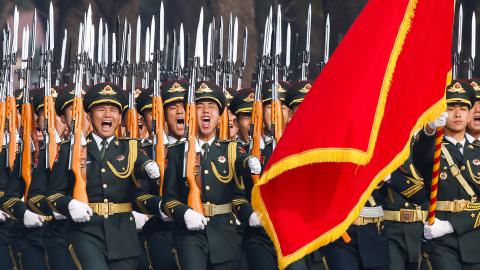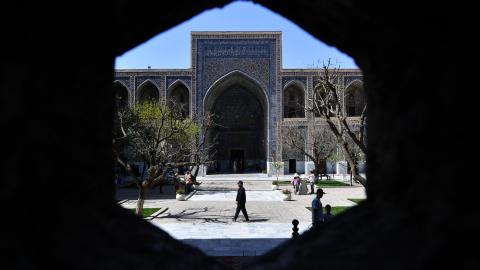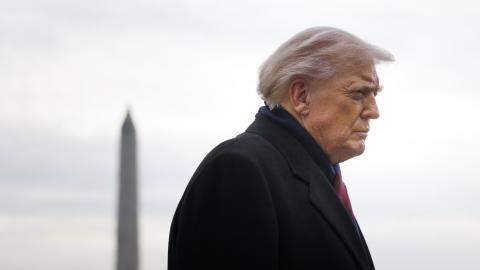With the Paris Olympics in full swing, Miles Yu analyzes how the Chinese Communist Party approaches international sports and plays politics with one of the greatest venues for displaying soft power. Miles then talks about China hosting Palestinian leaders in Beijing in a failed attempt to form a Palestinian unity government. He ends by explaining the CCP’s controversial plan to raise the retirement age in China.
China Insider is a weekly podcast project from Hudson Institute's China Center, hosted by Miles Yu, who provides weekly news that mainstream American outlets often miss, as well as in-depth commentary and analysis on the China challenge and the free world’s future.
Episode Transcript
This transcription is automatically generated and edited lightly for accuracy. Please excuse any errors.
Miles Yu:
Welcome to China Insider, a podcast from the Hudson Institute's China Center. I am Miles Yu, senior fellow and director of the China Center. Join me each week for our analysis of the major events concerning China, China threat, and their implications to the US and beyond.
Phil Hegseth:
It is Tuesday, August 6th, and we've got three topics again for Miles. First we start with the Paris Olympics and how the CCP approaches international sport and plays politics with one of the world's greatest venues for displays of soft power. Next, we cover China's hosting of Palestinian leaders in Beijing in an attempt to form a type of unity government for Palestinian Territories. Miles explains why it won't work and what China's interest is in the region in the first place. And we close on the domestic side of things with news that the CCP could be raising the age of retirement in China. A big change for a country with a big demographic problem. Hey Miles, good to see you again.
Miles Yu:
Good to see you, Phil.
Phil Hegseth:
Alright, so we'll start off this week with what everyone's watching on TV for the last week, and that's the Olympics in Paris. In our context specifically, though, the Olympic games really can be seen as one of the world's greatest venues for the exercising of soft power. And when you look at the medal counts, it can often mirror global influence. Not exactly, but at the time of recording today, the US leads the medal count with 72 total medals. China has 52 and France 44. So I'm curious, Miles, as an expert China watcher yourself, what do the Olympics mean for China and the CCP in particular?
Miles Yu:
Well, the Olympics are very different for the Chinese government as opposed to the rest of the world. But for most of the rest of the world, [the] Olympics basically is opportunity to mark the triumph of individual accomplishments. Of course, each individual represent a particular sovereign state, but ultimately it is about the individual. Triumph for China is a totally, totally mechanism for this state. And this Olympic is particularly pointed because China has abysmal international reputation. Right now I see a poll conducted by Pew, which is probably the most renowned for its accuracy and fairness just came out a couple of weeks ago. It says China's unfavorable ratings worldwide has been really, really bad. In France, the host country, the unfavorable rating for China is 70%.
Phil Hegseth: Yikes..
Miles Yu:
Right. France is a country with the second largest unfavorable rating for China, second only after Sweden. Wow. And of course, if you go to the US, go to Japan and go to South Korea, China's unfavorable rating reach as high as 90%. So this is a good opportunity for China to repair its abysmal international reputation. But it's very curious because if you watch the opening ceremony, the loudest cheers, reserved of course for the host country, France, the second loudest one for Ukraine,
Virtually no cheers for Team China and they broadcast for the Chinese team's appearance [lasted] only 10 seconds, so this is basically where China is, but China comes to Paris with a baggage. The Chinese team basically is a scandal rhythm. The most famous one obviously was the 2023 Chinese swimmers who tested positive for drug use before the 2021 Tokyo Olympics. Yet the International Olympic Committee, particularly the swimmer regulation WADA, the world Anti-Doping Agency, allowed the 23 Chinese swimmers to contend. And there were three gold medals and several other silver and bronze medals. So that's a scandal. So that's why the entire swimming events here this year in Paris is focused on Chinese swimmers, which is very, very unfortunate because the Chinese swimmers were very angry that they were excessively tested and humiliated even, and other swimmers from other countries basically scorned China and treated the Chinese swimmers with suspicion. And this mutual hostility was very obvious. Mutual accusation arose, but then people have to keep in mind the real culprit is a CCP regime that views Olympics as a global propaganda stage to [inaudible] the legitimacy of the regime, fewer people care about the gold medals in China. As a matter of fact, because this is something that's very, very, very interesting. Of course, there's also entire issue about China's sports policy, particularly toward the Olympics.
Phil Hegseth:
Well, that's what I was going to follow up. You talk about some of the scandals that they've been involved with. So how does the CCP approach international sport in general, or maybe a better way to say it's play politics with international sport?
Miles Yu:
Well, as I say, the international sports events were used by the government as a way to promote its own image, the party's image and the government's image, not necessarily to celebrate the triumph of individual athletes, but let's go to the specifics. The Chinese government runs Olympics sports and all other international sports programs, but the central government is completely state run. If you look at the US Olympic Committee, the United States, the Olympics committee does not receive one penny from the federal government. There was no federal government support at all. Not one penny from the American taxpayers. It was completely self-funded through private entrepreneurs, private efforts. But China is different.
All the Chinese athletes are professional members. In other words, there are no other jobs other than being full members of the Chinese national team. So they're isolated and they're insulated from the rest of the world. In our training cocoons, there is a wonderful, amazing Chinese diver, a girl by the name Quan Hongchan. She's 17 years old. She's a national sweetheart and global diving sensation. She's from the peasant family near Guangdong. And her parents, her father didn't even know his daughter is in Paris, competing for gold medals, and that's how isolated this athletes are. So this is just bizarre. Everything is for the country, for the party. The second one, I would say that particularly when it comes to Olympics, China focuses on a few medal-rich, but less popular sports just for the sake of getting more medals, which is nothing wrong, but again, there's a lot more popular sports with much larger participation by the…
Phil Hegseth:
Oh, that's interesting.
Miles Yu:
Now for China, of course, they focus on two medal-rich events. One is shooting, other one's diving, and they're very good at that. So China got a lot of them. That also another one medal-rich area, sports that is swimming. And swimming was unlike diving and shooting. Swimming is very popular, but swimming is dominated by the Americans and Australians. So China's trying to contend in this for the very large number of medals in swimming. But they have involved themselves in all kinds of scandals, as I mentioned earlier. So they have a way to go.
Phil Hegseth:
Oh, that's fascinating.
Miles Yu:
Yeah…
Phil Hegseth:
They would specialize in less competitive or less popular events so that they could dominate. Of course, everyone is super talented at the Olympics. Anybody who makes it but less popular pump people into those events so that you can rack up the gold medals and stay at the top of that metal count.
Miles Yu:
Well, China sucks at the oldest popular sports, soccer, for example, right? Basketball and then golf. I mean, they're not good, but they're good at some of the very obscure sports events like ping pong and…
Phil Hegseth:
Oh, I do love watching ping pong…
Miles Yu:
Ping pong and shooting. But then of course those are middle rich areas. So that's how China, they strategize this, well cut this off. Basically they plan very well. And also you see there's also major debate inside and outside China about the purpose of Olympic games for China support to participate for the Chinese team, it was pretty much a devoid of individual triumph. All glory belongs to the party and the country. There's one slogan, it's called 为国增光Every athlete is thinking that way, at least appear in public, we means to make the country glorious. That's it. It's not about making himself glorious, making his family glorious community, glorious, outstanding. Chinese athletes with individual spirits usually end up with defecting or fleeing to other countries. The most famous case was the two tennis players. One was Hu Na defected to the us and then eventually ended up in Taiwan in 1984.
But out recently, you see the China's tennis sensation, a woman by the name of Li Na, she's from Wuhan and she's individually spirited. She reached her zenith of career precisely because she left the national team. She was on her own like almost all other tennis players in the world. Many, many ping pong players for China, initially, they migrated, or you married to some other countries and become the members of our national teams for Japan, for Sweden, for France, and for Canada. They did very well. So that's basically the individualism versus collectivism debate in the Chinese sports world. Of course, there's also this issue of if everything is about getting medal for the country, what if you made a mistake? What if you couldn't make it? And that's basically a very interesting story to solve.
Phil Hegseth:
Yeah, you led right into it. That was going to be my question. I, we've been watching the Olympics very closely, my wife and I and my kids do. But I do legitimately wonder sometimes how a Chinese athlete might be received back home when they don't medal or they lose a gold. They're supposed to get upsetting the CCP or embarrassing its reputation on a global stage like the Olympics. But is there any actual truth behind that thought or?
Miles Yu:
Well, it is true because the stake is so high, the pressure on you is not your own sense of excellence. It's because the country, how they would treat you. You remember in the Olympics a couple days ago, there was a Chinese male gymnast. He made a mistake. He was shown to be sitting alone on the bench. All his teammates completely ignore[d] him, didn't want to say a word of comfort. And so it was very sad to watch that, and this guy just had no expression sitting over there ignored by his own team. Now, I'm not talking about just one particular individual. Everyone who made a mistake would be treated like that, if not necessarily by the officials in public, but definitely by the millions of internet mobs in China. The most famous case was China's greatest athlete, of course, probably in the century. A guy by [inaudible] and he won all kinds of medals.
He won probably 90% of all the international events he participated in. He was the fastest hurdler in Chinese history. He still is a keeper of the world record, but in 2008 in the Beijing Olympics, he had an injured foot. He could not possibly compete. So who withdrew and he became the scorn of the nation that people treat him like he's a traitor. And this man who dedicated the entire life to the glory of the country, of the party finally, who couldn't compete because of his personal injury, he had to leave China. He now lives in the United States with his family, and he vowed not to go back. But in contrast, you look at the Simone Biles, who made a wise decision in 2021 Tokyo Olympics, to withdraw because she suffered from some psychological block. She said her body and her head, mind could not coordinate, and she get tremendous support from her teammates, from the White House, from the whole nation. And a few years later, she triumphed again. So that's why that shows the difference between United States and China, particularly in the sports arena.
Phil Hegseth:
Yeah, that's a great juxtaposition. So we've covered some of their sport policy, but how specifically does the CCP play politics with the Olympics?
Miles Yu:
Well, of course the biggest political hot potato for the Chinese is the issue of Taiwan. Taiwan is participating all international sports under the name of Chinese Taipei, but China always tried to politicize and [ideological-ize] these international sports, particularly the Olympics. You look at this year's Olympics, according to the Chinese authorities, which pressed, which put a lot of pressure on the hosting organization, hosting country, no sign, the bare name of Taiwan should be allowed not even in official proceedings, but also in the audience. If you hold a sign that says Taiwan, the security people will come here to confiscate your stuff. That's ridiculous. That's a shame of International Olympic Committee for allowing China to be such a bully. Now, there was a famous woman from Taiwan during the badminton contest when she held of the sign that shows the map of Taiwan. It's just the geographic location of Taiwan.
She's so proud of her country with the words they say, come on, Taiwan, cheer for Taiwan, and a Chinese man, which no doubt is planted by the government of China in the audience, and just rushed to her and grabbed that sign and basically threw it away. And this is absolutely brilliant, acted like a bully. So this is a very, very sad. On the other hand, the double badminton final was played between the Chinese team and the Taiwanese team was fantastic. Yeah, the Taiwanese team was a reigning champion from the Tokyo Olympics. So the Chinese government decided not to live stream this event, which caused a lot of problem for the fans, so under the pressure from the fans, they began to sort of live stream portion of it only when the Chinese team seemed to be winning, and when the Taiwanese team began to show their advantage began to win the cut of the live streaming.
In the end, they completely cut it off because ultimately the Taiwanese man's double badminton team won the create a sensation in Taiwan. The Taiwanese people are celebrating this as if it's Chinese New Year and when they play the anthem, but it's not Taiwanese national anthem because international Olympic Committee would not allow Taiwan to play that. They play the Taiwanese national flag song, which is the same melody as the Taiwanese national anthem, but it was different lyrics. This is basically humiliating for Taiwan. I think the International Olympic Committee should really reconsider its policy. If you allow two teams representing entirely different population, different governments to play, the winner should be treated with respect, particularly it's a national entity should be play. So I mean for China to play politics over there, it's really, really a shame. I think that's one of the reasons why China ploy to salvage his terrible international reputation at the Olympics would not work.
Phil Hegseth:
Okay. Our second topic brings us to the contested and increasingly tense Middle East right now. In late July, China hosted a ‘reconciliation dialogue’ with Palestinian leaders of Hamas and Fata attempting to come together to form a unity government of sorts, to administer places like war touring Gaza. It sounds like the proposal that came out of the meeting called the Beijing Declaration was quickly shot down by Israel. But what should we take away from the smiles?
Miles Yu:
Well, China basically wants to save Hamas from being annihilated by Israel. China is solidly behind Hamas. China has never condemned Hamas atrocities for the October 7th. China always condemned Israel when Israel tried to strike back at this moment in time when Hamas was on the verge of being annihilated, its leaders have been assassinated by Israel and its international reputation was in the tank. And China come into basically force Hamas to be integrated by the Fatah to be embraced by Fatah. Fatah, of course, represents the Palestinian authority. So what China is trying to do is to prolong the legitimacy of Hamas, to make Hamas a part of the legitimate Palestine authority regime while in eyes of Israel, neither of them is legitimate because they would not recognize Israel's right to exist. So this is basically China's ploy. This, the whole thing is really about China rigorously promoting strategic distractions anywhere in the world to the United States, which focuses China, which focuses on the China threat. So the Middle East obviously is a very good spot. So this whole effort of so-called Beijing Declaration is about to prolong this strategic destruction for the United States, so US will be less efficient in focusing on China. China's doing the same thing in Ukraine. That's why China is solid behind Russia, it's war effort in Ukraine. China is now bankrolled in Russia's war economy providing Russia's killing machines with a critical technology, particularly the drones so that Ukraine will be another ongoing and prolonged strategic destruction for the United States and China during the same thing in Venezuela.
Yeah, Venezuela is in China's pockets. Maduro is totally in China's pockets, and Venezuela of course is making the mess over there. Venezuela is vowing to annex two thirds of Guyana. That's going to create a lot of problems. So the US would have to respond to that. This is China's ploy, so I don't say anything exceptional, this effort. Every time when this happened, China always is on the side of the bad guys.
Phil Hegseth:
Well, you paint a picture there, and we may have covered this before, but I think we can quickly retread this ground if possible. And maybe the answer is a quick no. So that's okay. But does China have real objective interests in the Middle East specifically with the Palestinian authority, or is this all really just to counter Western influence and create distractions like you're saying?
Miles Yu:
Yeah, China's China law traditionally views the Middle East as the Americans’ sphere of inference. First is like first sphere. Inference is very 19th century, but China still lives in the 19th century. So that's how they view the world. So when the United States began to sort of retreat from the Middle East, Americans inference is waning in the last several years, China saw the opportunity. So they move in, try to get to Saudi Arabia on site, try to get all the other Gulf states on its side mostly by bribery. So this is all geopolitically motivated, China's interested there. Of course, there is also oil, there's also minerals. There are also all sort of other, but the whole purpose is to use the opportunity to isolate the United States as a global leader.
Phil Hegseth:
Finally, we shift our focus to the domestic side of Chinese politics. In short, China is getting older, life expectancy is rising, and understandably, that's putting a strain on government support systems. I found this fascinating for anyone who doesn't already know, like me, what their retirement ages are in China right now, according to the BBC, it's currently 60 years old for men, 55 for women in white collar jobs and 50 for ‘working class women.’ I think the problem is pretty clear here, Miles, but what is the CCP planning to do?
Miles Yu:
Okay, so this is sort of a fire storm caused by a very short sentence in the Chinese Communist Party. The Third Plenum Communique because the issues every weeks ago not communicated was very long and wordy and verbal. That's about 22,000 characters of mumbo jumbo. But there's one sentence about 30 Chinese characters that caused this national storm. It says, ‘we're going to implement a policy based upon volunteerism and flexibility to steadily proceed with the delaying of the retirement age.’ As you say, the Chinese legal retirement age is very, very low. Men's 60 and women's 50 for blue collar workers and 55 for white collar ladies. This is about five to 10 years on average, younger than Western developed countries. It seems to me that China's doing this because China's pension system is in serious trouble. The government cannot pay a retired person starting at the younger age. But I think most importantly China looks at the demographic issue here. The most productive age groups in China are being crushed by a huge army of retirees, the young grandparents, because those young grandparents, when they're retired, they have to be supported by young couples in their late twenties and early thirties. And so because of the four decades of one child policy, one young couple in their late thirties or late twenties or early thirties would have to support four elderly retirees plus their own children,
Phil Hegseth:
Right?
Miles Yu:
So those people, even though they're most productive age, but they're most burdened too. So a method to solve this, it seems to me is by putting the grandparents back to work, this is motivated by that. I think [the consequences] are going to be very profound. Number one, young people will suffer greatly at the job market because they will worsen the already extremely high unemployment rate and also extremely tight job market, especially in the non-state sector. But it will also greatly increase the size of the state sector, which means the Chinese bureaucracy, which is already huge. Now, Chinese bureaucracy in the state sector is parasitic, they don't produce anything, but they're supported by the non-state sector, which is a target of the state policy now. I mean, they just eliminated a whole bunch of other smaller, big and small non-state companies. So what we're doing is this is going to be such a big, big national confrontation in the years to come. The Chinese Communist Party said, we have to do it. We have to implement it by 2029. So we have a few years and we'll see what happened. But nevertheless, this is an issue of serious matter, serious consequences. We don't know exactly how it's going to affect the nation, but I think the effect is going to be very tremendous.
Phil Hegseth:
Yeah, I can't imagine it'll be small. Usually when we hear about retirement age changes, there's a large response from the population. So I wouldn't expect anything different here, but we will cover that when that happens. And thanks so much, miles for talking again this week.
Miles Yu:
Thank you very much. I'll go back to Olympics right now, particularly after the US is winning.
Phil Hegseth:
There we go. Me too.
Miles Yu:
Thank you for listening to this episode of China Insider. I'd also like to thank our executive producer, Philip Hegseth, who works tirelessly and professionally behind the scenes for every episode. To make sure we deliver the best quality podcast to you, the listeners. If you enjoy the show, please spread the word. For Chinese listeners. Please check our monthly review and analysis episode in Chinese. We'll see you next time.




















